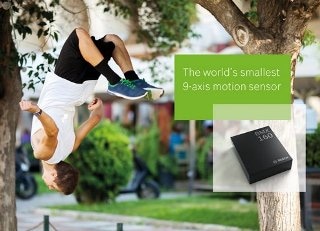Jun 22 2016
Today, Bosch Sensortec is launching the BMX160, a compact 9-axis motion sensor that is ideally suited for a wide range of applications such as smartphones, smart watches, fitness trackers, smart jewelry – e.g. rings, necklaces – as well as Augmented/Virtual Reality devices.
 The new BMX160 from Bosch Sensortec is ideally suited for a wide range of applications such as smartphones, smart watches and fitness trackers.
The new BMX160 from Bosch Sensortec is ideally suited for a wide range of applications such as smartphones, smart watches and fitness trackers.
Compared to smartphones, wearables face much harsher space and power constraints. It's precisely this environment where a tiny power-efficient 9-axis sensor like the BMX160 offers an ideal solution. This new sensor is housed in a compact 2.5 x 3.0 x 0.95 mm3 package, the smallest 9-axis motion sensor in the industry.
By combining Bosch Sensortec’s advanced accelerometer, gyroscope and geomagnetic sensor technologies, the BMX160 is able to meet the increasingly more stringent low-power requirements demanded by wearable devices. Bosch's low-power sensor technology makes this the standout 9-axis inertial sensor on the market, reducing power consumption below 1.5 milliampere (mA). This sensor is ideally suited for applications that face extreme form factor restraints, e.g. in smart glasses.
“By combining Bosch Sensortec’s advanced sensor technologies into a single compact package, the BMX160 sets new industry benchmarks for high performance, tiny footprint and low power consumption”, said Jeanne Forget, Vice President Marketing, Bosch Sensortec. “This device finally overcomes today’s placement constraints in smartphones and directly addresses the demands of wearable devices, where PCB space and low power consumption are at an even greater premium”.
Enabling wearable applications
The BMX160 sensor enables Android wearable applications relying on sensor data such as device orientation, magnetic heading or the gravity vector. Moreover, the sensor supports applications such as 3D indoor mapping and smartphone optimized virtual reality applications – e.g. cardboard Virtual Reality (VR). The sensor can be used in conjunction with the Bosch Sensortec BSX sensor data fusion software library to further optimize performance.
The single-package BMX160 effectively replaces the present mainstream two-component workaround solution, i.e. combination of a 6-axis IMU with a 3-axis geomagnetic sensor. This innovative 9-axis motion sensor provides the placement flexibility necessary for overcoming current limitations on positioning of the magnetic sensor. Pin- and register-compatibility with Bosch Sensortec’s industry-standard 6-axis BMI160 IMU simplifies the task of upgrading designs.
Built-in power management unit
The BMX160 has a built-in power management unit and ultra-low power background application features. This enables the power-hungry application processor to remain in sleep mode much longer, for example when counting steps, which further contributes to extending battery recharge intervals. The integrated step counter function and the Android compatible significant motion detector only consume 30 microampere (µA) each.
The accelerometer, gyroscope and magnetic technology in the BMX160 have been optimized for low offset, low noise and best temperature stability. Bosch Sensortec gyroscope technology offers an extremely low drift, which is a key requirement for an accurate real-time user experience, especially in augmented and virtual reality applications.
Availability
Samples are available for development partners.